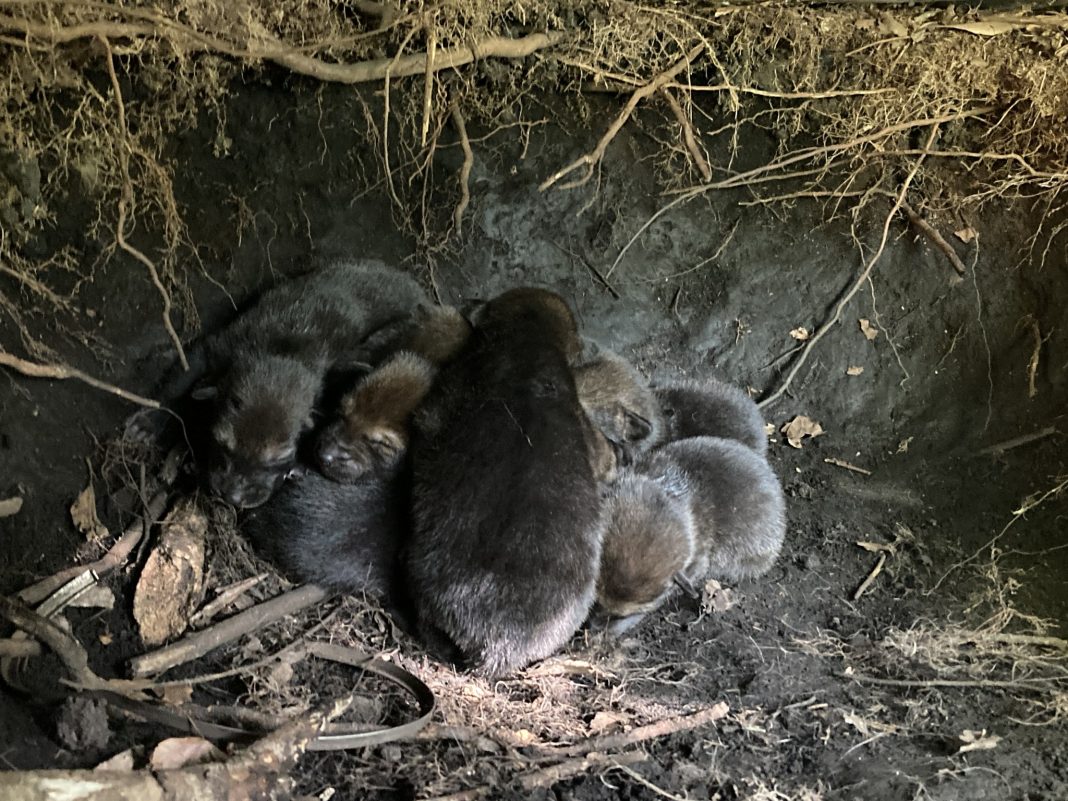Submitted by Wolf Haven International
In October 2023, critically endangered American Red wolf, M2191, was transported from Wolf Haven International to the Alligator River National Wildlife Refuge in eastern North Carolina. M2191 was placed in an acclimation pen in the local territory of the Milltail pack in the hopes that he would be accepted into their family group. After three months of positive interactions with the pack through the acclimation pen fence, M2191 was released and took his first steps into the wild on January 26, 2024.
Shortly after his release, M2191 was seen traveling with the pack’s breeding female, F2225, on remote camera. He integrated well with her four two-year-olds and four yearlings, and in mid-April, the United States Fish and Wildlife Service (USFWS) confirmed that F2225 and M2191 produced their own litter of eight pups!
The original American Red wolf range extended throughout the southeast, up and down the eastern seaboard, and as far west as Texas, Missouri, and Arkansas. However, aggressive predator control, habitat loss, and hybridization with coyotes reduced the wild American Red wolf population to a mere 14 wolves by the late 1970s. The Endangered Species Act prevented the complete eradication of the American Red wolf and a recovery plan was developed by USFWS to manage and oversee the recovery of this critically endangered species.
Today, American Red wolves remain one of the most endangered species in North America, with only 19 to 21 individuals estimated to be living in their native North Carolina habitat. This is the world’s only wild population of American Red wolves.
Wolf Haven, an internationally recognized wolf sanctuary and education center in Tenino, Washington, has participated in the American Red Wolf SAFE program since 2003 and the Mexican Wolf SAFE program since 1994 (formerly Species Survival Plan/SSP programs). Wolf Haven follows strict guidelines when caring for SAFE animals – interactions with humans are kept to a minimum and observations are done by remote camera.
M2191 (house-named Finch while in captivity) was born at Wolf Haven in 2016, and for more than seven years, Wolf Haven’s animal care team worked diligently to ensure he remained as wild as possible while also preparing him for the possibility of release into the wild. At the annual SAFE meeting in July 2023, M2191 was recommended for release and Wolf Haven’s Lead Animal Care Specialist, Judah Jamison, quickly began working with program leaders to develop a plan to relocate him from Washington to the recovery area in North Carolina. “It is an incredible honor to be part of the SAFE program and the American Red wolf recovery effort,” says Jamison. “Knowing that a wolf who lived seven years at Wolf Haven has integrated into a wild pack is overwhelmingly joyful and humbling.”
M2191 is the second American Red wolf from Wolf Haven to be released into the wild in North Carolina, following the release of F2216 (house-named Iris) in 2021. In addition to these pivotal releases, five litters of American Red wolves have been born at Wolf Haven in the past 20 years. Sanctuary Director Pamela Maciel Cabañas, who has been with the organization for over ten years, is continually inspired by the work Wolf Haven is doing to conserve and protect wolves. “To have any of these pups not only get a chance to live their full potential in their natural habitat, but to also potentially contribute to the growth and genetic diversity of the wild population by producing pups of their own, brings the work we do full circle.”
For more information about Wolf Haven International’s American Red wolf and Mexican wolf conservation efforts, please visit the Wolf Haven website. Updates from USFWS on the wild American Red wolf population can be found at the US Fish & Wildlife service website.



















































